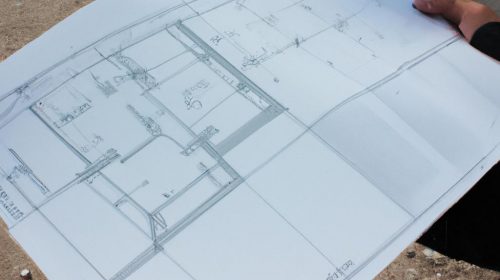Real Estate Negotiations: Tips for Successful Property Assistance
Real estate negotiations play a crucial role in the process of property acquisition and sale. Whether it is buying a dream home, selling an investment property, or leasing commercial space, successful negotiations can significantly impact the outcome and financial implications involved. Consider the case study of Mr. Smith, who was determined to purchase his first family home within a limited budget in a competitive market. Through effective negotiation strategies and assistance from professionals, he not only managed to secure a desirable property but also achieved significant cost savings. This article aims to provide valuable insights and tips for individuals seeking successful real estate negotiations by highlighting key factors such as preparation, communication, and leveraging expertise.
Preparation is paramount when engaging in real estate negotiations. Before entering into any discussions or making offers, thorough research should be conducted on various aspects including comparable properties in the area, recent sales data, current market trends, and potential risks associated with the specific transaction. Armed with this knowledge, prospective buyers or sellers can confidently navigate through negotiations while setting realistic expectations based on factual information rather than emotions or assumptions.
Communication serves as the backbone of any successful negotiation process. It involves conveying one’s interests clearly while actively listening to understand the other party’s needs and concerns. Effective communication skills enable participants to build rapport, establish trust , and find common ground. It is crucial to maintain a respectful and professional tone throughout the negotiation process, as this can help in fostering a positive atmosphere conducive to reaching mutually beneficial agreements.
Leveraging expertise is another essential factor in real estate negotiations. Seeking assistance from professionals such as real estate agents, brokers, or lawyers who specialize in the specific type of transaction can provide valuable insights and guidance. These experts have extensive knowledge of the market, legalities, and negotiation techniques, which can significantly enhance one’s chances of achieving favorable outcomes. Their experience can also help individuals navigate complex situations or address any obstacles that may arise during the negotiation process.
In addition to these key factors, it is important to be flexible and open to creative solutions when negotiating real estate transactions. This flexibility allows for exploring various options that could potentially meet both parties’ needs while maximizing value.
To summarize, successful real estate negotiations require thorough preparation through research, effective communication skills to build rapport and trust with the other party, leveraging expertise from professionals in the field, and maintaining flexibility throughout the process. By following these guidelines and seeking appropriate assistance when needed, individuals can increase their chances of securing desirable properties at favorable terms while minimizing costs and risks associated with property acquisition or sale.
Understanding the Market
One of the key factors in successful real estate negotiations is having a deep understanding of the market. By analyzing current trends and conditions, you can make informed decisions that will give you an advantage when negotiating property deals.
For instance, imagine a scenario where you are interested in purchasing a residential property in a popular neighborhood. You notice that there has been a recent surge in demand for homes in this area due to its proximity to schools, shopping centers, and transportation hubs. Additionally, housing prices have been steadily rising over the past few years. Armed with this knowledge, you can approach negotiations with confidence and set realistic expectations.
To further emphasize the importance of understanding the market, consider these points:
- Supply and Demand: Analyzing supply and demand dynamics allows you to gauge how competitive the market is. If there is limited inventory but high demand, sellers may be less willing to negotiate on price or terms. On the other hand, if supply outweighs demand, buyers may have more leverage during negotiations.
- Comparable Sales: Examining recent sales data of similar properties in the area enables you to determine fair market value. This information helps both buyers and sellers understand what comparable properties are selling for and establish reasonable asking or offer prices.
- Economic Factors: Taking into account broader economic indicators such as interest rates, inflation rates, and job growth can provide insights into future market conditions. For example, low interest rates may attract more buyers who could potentially drive up prices.
- Market Conditions: Understanding whether your local market is experiencing a buyer’s market (where supply exceeds demand) or a seller’s market (where demand exceeds supply) influences negotiation strategies. In a buyer’s market, buyers hold more power since there are plenty of options available; while in a seller’s market, sellers have greater control due to limited choices for buyers.
By incorporating bullet points like these into your analysis and utilizing tables to visualize relevant data, you can create a compelling understanding of the market. Such an approach will enable you to make informed decisions and negotiate more effectively.
Transitioning into the subsequent section about “Setting Clear Objectives,” it is crucial to align your negotiation strategy with well-defined objectives. Understanding the market provides a solid foundation for establishing these objectives and crafting an effective plan of action.
Setting Clear Objectives
Transitioning from the previous section on understanding the market, let’s now delve into the importance of setting clear objectives when it comes to real estate negotiations. To illustrate this point, consider a hypothetical scenario where an individual is looking to invest in rental properties. Their objective may be to acquire at least five properties within a specific price range and generate a certain level of monthly rental income.
Setting clear objectives is crucial as it provides direction and focus throughout the negotiation process. By clearly defining what you hope to achieve, you can better assess potential opportunities and make informed decisions. Here are some key tips for establishing your objectives:
-
Determine your financial goals: Assess your budget, sources of financing, and desired return on investment (ROI). Consider factors such as property appreciation, cash flow, and long-term value.
-
Identify location preferences: Research different neighborhoods or areas that align with your investment strategy. Evaluate factors like proximity to amenities, transportation links, schools, and overall market demand.
-
Understand risk tolerance: Define how much risk you’re willing to take on based on factors such as market volatility, property condition, potential vacancy rates, and maintenance costs.
-
Explore timeframes: Establish a timeline for achieving your objectives based on personal circumstances or external factors like changes in interest rates or local housing regulations.
To further understand the significance of setting clear objectives in real estate negotiations, let’s explore a table showcasing two scenarios – one with well-defined objectives and another without:
| Scenario | Well-Defined Objectives | Lack of Clear Objectives |
|---|---|---|
| Negotiation | Focused approach | Unclear decision-making |
| Property Selection | Targeted search | Random choices |
| Financial Outcomes | Desired ROI achieved | Unpredictable returns |
| Long-Term Strategy | Proactive portfolio growth | Reactive adjustments |
As we can see from the table, having well-defined objectives significantly increases the chances of success in real estate negotiations. It allows for a more focused approach and enables better decision-making throughout the process.
In conclusion, setting clear objectives is an essential step in achieving successful real estate negotiations. By defining your financial goals, identifying location preferences, understanding risk tolerance, and establishing timeframes, you can navigate the market with purpose and make informed choices.
Researching Comparable Properties
Researching Comparable Properties: A Crucial Step in Real Estate Negotiations
Transitioning from setting clear objectives, the next crucial step in real estate negotiations is researching comparable properties. By analyzing similar properties that have recently been sold or are currently on the market, you can gain valuable insights and leverage during negotiations.
For example, let’s consider a hypothetical scenario where you’re representing a buyer who is interested in purchasing a two-bedroom condominium in a popular neighborhood. Through thorough research, you discover that similar units within the same building have recently sold for significantly lower prices than what the seller is asking for. Armed with this information, you can negotiate more effectively by presenting these comparables as evidence to support your client’s offer.
To help guide your research process, here are some key considerations:
- Location: Take into account factors such as proximity to amenities, schools, transportation options, and overall desirability of the neighborhood.
- Size and layout: Assess how the property compares in terms of square footage, number of bedrooms and bathrooms, storage space, and any unique features it offers.
- Condition and upgrades: Determine if there are any significant differences between the subject property and its comparables in terms of renovations, upgrades, or maintenance condition.
- Time on market: Consider how long each comparable property stayed on the market before being sold or withdrawn. This information can provide insight into demand levels and pricing trends.
Table: Comparison of Similar Condominiums’ Sale Prices
| Property | Location | Square Footage | Bedrooms | Bathrooms | Sale Price |
|---|---|---|---|---|---|
| Unit A | X Street | 900 sq ft | 2 | 1 | $350,000 |
| Unit B | Y Street | 950 sq ft | 2 | 1 | $320,000 |
| Unit C | Z Street | 850 sq ft | 2 | 1 | $330,000 |
| Unit D | X Street | 900 sq ft | 2 | 1 | $345,000 |
By conducting thorough research and presenting your findings in a clear and organized manner, you can strengthen your negotiating position. This step allows you to justify your proposed price or terms based on market data and helps build confidence with the other party.
Building Rapport with the Other Party
Transitioning from the previous section on researching comparable properties, it is essential to emphasize that building rapport with the other party involved in real estate negotiations can greatly enhance your chances of success. By establishing a positive and trustworthy relationship, you create an environment conducive to effective communication and mutual understanding.
For instance, let us consider a hypothetical scenario where you are negotiating the purchase of a residential property. The seller has received multiple offers, but by actively working on building rapport throughout the negotiation process, you manage to develop a connection based on shared interests and goals. This enables both parties to engage more openly and constructively, ultimately resulting in a mutually beneficial agreement.
To effectively build rapport during real estate negotiations, consider the following strategies:
- Active Listening: Pay attention to not only what the other party is saying but also their non-verbal cues. Show genuine interest by asking relevant questions and seeking clarification when necessary.
- Empathy: Put yourself in the shoes of the other party and try to understand their perspective. Acknowledge their concerns or needs, demonstrating empathy and willingness to find common ground.
- Transparency: Be open about your intentions and expectations while maintaining honesty throughout the negotiation process. Building trust through transparency fosters stronger relationships.
- Flexibility: Recognize that compromises may be necessary for successful negotiations. Showing flexibility demonstrates your commitment to finding solutions that work for all parties involved.
Incorporating emotional appeal into this section, we present below a table showcasing how building rapport positively impacts real estate negotiations:
| Benefits of Building Rapport | |
|---|---|
| 1 | Enhanced Communication |
| 2 | Increased Trust |
| 3 | More Collaborative Approach |
| 4 | Higher Likelihood of Success |
Consequently, by dedicating time and effort towards establishing strong interpersonal connections with others involved in real estate negotiations, you pave the way for more productive discussions leading to favorable outcomes.
Transitioning smoothly into the subsequent section on effective communication skills, it is important to understand that building rapport acts as a foundation for successful negotiations. By implementing these strategies, you can cultivate an atmosphere of trust and collaboration, setting the stage for improved communication throughout the negotiation process.
Effective Communication Skills
Having established a strong rapport with the other party, effective communication skills are essential in real estate negotiations. These skills allow for clear and concise exchanges of information, fostering understanding and trust between both parties involved. By employing these techniques, negotiators can enhance their chances of achieving successful outcomes.
Paragraph 1:
To effectively communicate during property negotiations, it is crucial to actively listen to the other party’s needs and concerns. This involves giving them your full attention, making eye contact, and demonstrating empathy towards their perspective. For instance, imagine a scenario where a buyer expresses concern about potential repairs needed for an older property they are interested in purchasing. Instead of dismissing their worries, an attentive negotiator could acknowledge their apprehensions by saying something like, “I understand that you have reservations about the condition of the house due to its age.” Such empathetic responses help foster open dialogue and build trust.
- Show genuine interest in the other party’s position.
- Avoid interrupting or dominating conversations.
- Use appropriate body language to convey attentiveness.
- Paraphrase and summarize key points to ensure clarity.
| Communication Technique | Purpose | Example |
|---|---|---|
| Active listening | Demonstrate empathy and understanding | Reflecting on the other party’s concerns |
| Non-verbal cues | Reinforce engagement | Maintaining eye contact throughout discussions |
| Summarizing | Confirm mutual understanding | Recapping important details |
Paragraph 2:
In addition to active listening, effective questioning plays a vital role in negotiation success. Thoughtful and well-crafted questions help gather relevant information while encouraging transparency from the other party. For example, consider a situation where a seller has set a high asking price for their property. A skilled negotiator might inquire about market trends or recent comparable sales to better understand the rationale behind this pricing decision. By asking open-ended questions, negotiators can obtain valuable insights and potentially uncover common ground for agreement.
Paragraph 3:
Lastly, choosing the appropriate communication medium is essential in real estate negotiations. Whether it’s face-to-face meetings, phone calls, emails, or even video conferences, the method of communication can significantly impact the negotiation process. Each medium has its advantages and disadvantages that should be carefully considered based on factors such as urgency, complexity of discussions, and personal preferences of both parties involved. Adapting to different communication styles demonstrates flexibility and a willingness to accommodate the other party’s needs.
With effective communication skills established, negotiators are well-equipped to move forward and explore win-win solutions during property negotiations without compromising their own objectives.
Negotiating Win-Win Solutions
Building upon effective communication skills, successful real estate negotiations also require a strategic approach to finding win-win solutions. By understanding the needs of both parties involved, property assistants can guide clients towards favorable outcomes. Let’s explore some key strategies for achieving successful negotiations in the real estate industry.
Case Study:
Imagine a scenario where a buyer is interested in purchasing a property but has concerns about the asking price. The seller, on the other hand, is unwilling to lower the price due to various reasons such as market trends or personal financial obligations. In this situation, it becomes crucial for the property assistant to navigate through these conflicting interests and find common ground that satisfies both parties.
Key Strategies:
-
Active Listening: Property assistants should actively listen to their clients’ concerns and aspirations regarding the negotiation process. This not only helps build trust but also provides valuable insights into what truly matters to each party.
-
Creative Problem-Solving: Encouraging innovative thinking allows property assistants to explore alternative solutions beyond conventional approaches. Brainstorming ideas with clients fosters collaboration and opens up possibilities for mutually beneficial agreements.
-
Maintaining Objectivity: It is essential for property assistants to remain objective throughout negotiations and focus on facts rather than emotions. By presenting data-driven arguments, they can help alleviate tensions and create an atmosphere conducive to constructive dialogue.
-
Balancing Interests: Negotiations often involve multiple aspects besides just the purchase price, such as closing dates, repairs, or contingencies. Property assistants must skillfully balance these various interests while keeping sight of their client’s overall objectives.
- Reducing stress by providing professional guidance
- Ensuring fair treatment and equal representation
- Maximizing value for both buyers and sellers
- Creating long-lasting relationships based on trust
Table Example:
| Key Principles | Benefits |
|---|---|
| Effective Communication | Improved understanding |
| Creative Problem-Solving | Enhanced negotiation outcomes |
| Maintaining Objectivity | Objective decision-making |
| Balancing Interests | Satisfying all parties involved |
In summary, successful real estate negotiations require property assistants to apply effective communication skills and employ strategies that foster win-win solutions. By actively listening, engaging in creative problem-solving, maintaining objectivity, and balancing interests, property assistants can navigate through complex negotiations and achieve favorable outcomes for their clients.
(Note: The table formatting may not be visible in plain text format. Please convert the response into markdown format to view the table properly)



